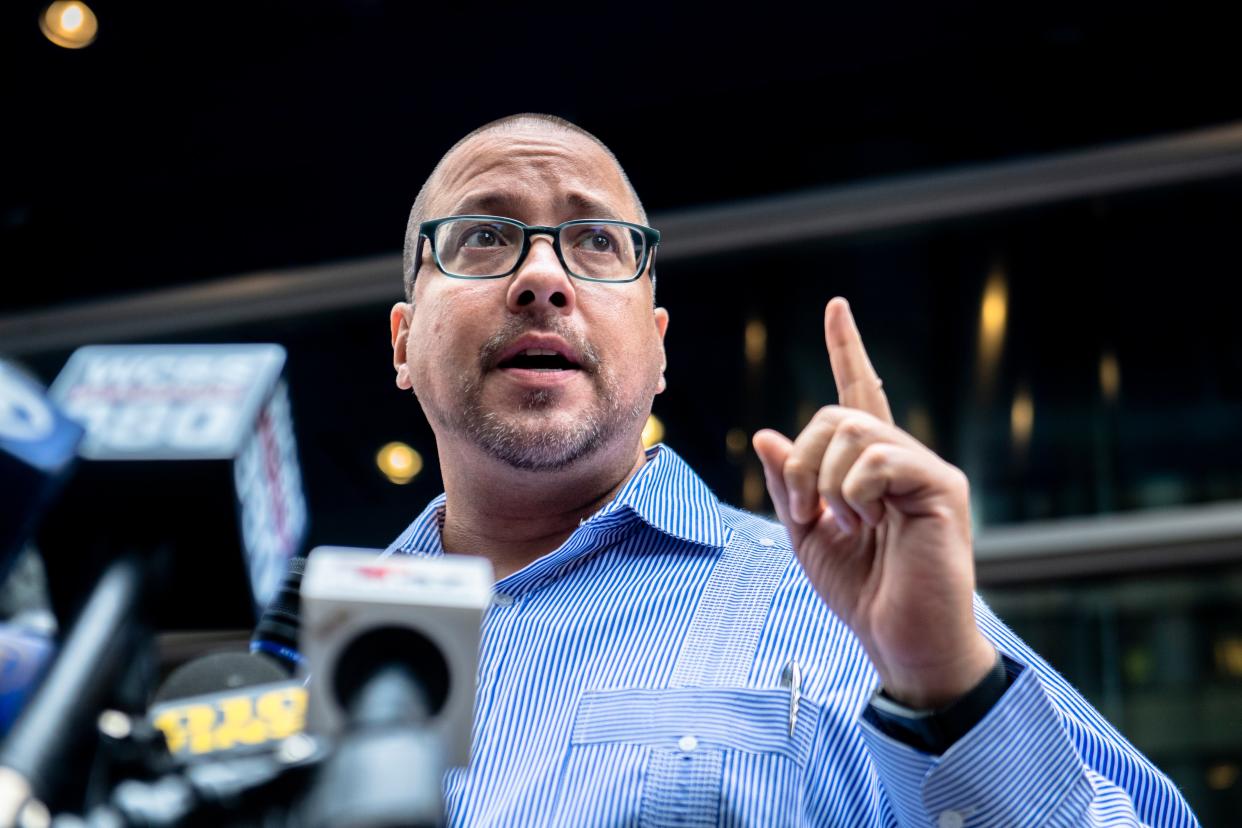State Sen. Gustavo Rivera faces criticism on stalled N.Y. efforts to regulate gabapentin, an opioid enhancer drug
ALBANY — Efforts to classify a controversial opioid enhancer as a controlled substance in New York stalled shortly after state Sen. Gustavo Rivera took over leadership of his chamber’s Health Committee.
Gabapentin, one of the most prescribed drugs in the U.S., is known to enhance the euphoric effects of opioids and is increasingly tied to overdoses, prompting a push to have it classified as a controlled substance at the federal and state level.
Rivera, a Bronx Democrat facing a tough primary battle this month, dropped a bill in 2020 that would have done just that in the Empire State, defending the move as a change in approach to battling the opioid epidemic.

New York State Senator Gustavo Rivera (D-Bronx) photographed in New York on Aug. 4, 2021. (Brittainy Newman/)
But supporters of the classification say it’s a step in the wrong direction.
“It’s disappointing that it hasn’t passed yet,” Michael Abrams, a senior health researcher with the nonprofit consumer advocacy group Public Citizen, told the Daily News. “It’s more than disappointing. People have probably died because it hasn’t passed.”
The drug, also known as Neurontin and developed by Pfizer, has a sordid history. It is often doled out for myriad uses, including shingles, pain management, migraines, restless legs syndrome, hot flashes, insomnia and anxiety.
In 2004, Pfizer paid $430 million in settlements for promoting the drug off-label as a painkiller. However, prescriptions for the medication have skyrocketed despite the federal Centers for Disease Control and Prevention and others reporting a link between gabapentin and opioid overdose deaths.
Public Citizen earlier this year called on the U.S. Drug Enforcement Administration and the Food and Drug Administration to classify the drug as a Schedule V controlled substance at the federal level. That means it serves a medicinal purpose, but there is the possibility for abuse.
Rivera said the classification ran counter to the state’s efforts to combat the opioid epidemic and “served to criminalize those individuals struggling with substance use and reduce access for legitimate medical purposes.”
“If we were to treat it as a controlled substance, we could potentially hinder the ability of many patients, especially those in marginalized communities, to have appropriate access to the medication,” the lawmaker said. “We need to prioritize legislation that focuses on harm reduction, treatment and recovery.”

Bottles of gabapentin at a pharmacy in San Francisco in 2018. (Jeff Chiu/)
Abrams said that track runs parallel to the wishes of the pharmaceutical industry, which opposes any regulation attempt, no matter how beneficial it could be for doctors, pharmacists and consumers.
Lobbyists and Big Pharma firms padding Rivera’s campaign coffers with cash came as no surprise either, he added.
Since joining the Senate, Rivera has accepted contributions totaling $8,000 from Pfizer and Pharmaceutical Research and Manufacturers of America (PhRMA), a pharmaceutical industry trade group of which Pfizer is a member. Both groups doubled the amount they contributed once Rivera was named Health Committee chairman. The Bronx pol has also taken an additional $8,250 from Pfizer-linked lobbyists during his tenure in Albany.
“I’m not surprised the chair of the Health Committee is getting money from Pfizer and Pharma, no shocker there,” Abrams said. “Certainly their attitude towards this kind of provision ... is thumbs down. They want as little regulation of their medicines as possible.”
As of late last year, gabapentin has been marked as a Schedule V controlled substance in seven states over the past five years. During that same time period, 12 other states have placed the drug in their prescription drug monitoring programs, according to Pharmacy Today.
In an opposition memo to the now-defunct New York bill, the Drug Policy Alliance pushed back on the categorization of gabapentin as a controlled substance, arguing the medicine is “an effective alternative to opioid medication and should not be criminalized.”
A separate New York bill that would include pain management medications such as gabapentin on a death certificate when a death is caused by an opioid overdose has also failed to move in both chambers of the Legislature in recent sessions.
As Health Committee chairman, Rivera argues, he has repeatedly advanced and sponsored progressive measures meant to combat the pharmaceutical industry’s grip on New Yorkers’ wallets and the health care system at large.
He cites the New York Drug Manufacturing Act, which would “increase competition, lower prices and address shortages for generic prescription drugs,” as well as a bill that would cap the cost of insulin. He has also won plaudits for backing the New York Health Act, which would provide universal health coverage for every New Yorker.
“Additionally, my legislative record speaks for itself,” Rivera said. “It is outrageous and a gross misrepresentation to say otherwise. "
